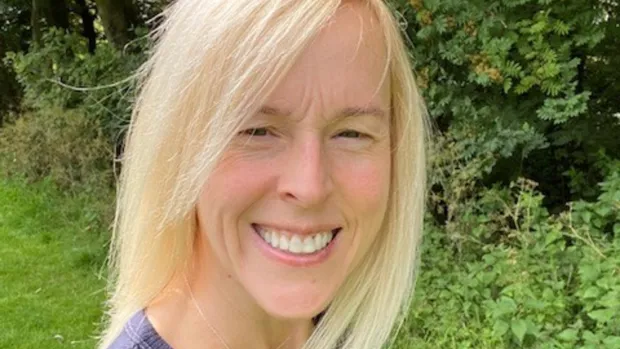
I feel uncomfortable talking about MS - but I want others to feel less alone
In the spring of 2019 I was working as a teacher and my face kept going numb. Alongside this my speech would slur every so often.
One night I was chatting to friends and my words weren’t coming out right at all. Anyone would have thought I was drunk – though I’ve never even tasted alcohol!
I was really frightened and after ringing the GP for advice went to A&E. Tests ruled out a stroke, as did a later appointment with a stroke consultant.
Getting the right diagnosis
One morning in January 2020 I woke up and the right side of my head was numb, and I was stumbling when I walked. When I rang my mum in a panic, I found my words slurred again. I had another trip to A&E and again a stroke was ruled out. I was sent home.
I quickly deteriorated, experiencing more and more symptoms. By February I was dependent on my family for everything. My mum rang for an ambulance, and once I was in hospital she refused to let them send me home.
Someone from the neurology team visited me and recommended an urgent MRI scan of my brain and spine. But nothing happened, so I booked in for a private MRI scan, which showed lesions on my brain. I went back to the NHS for further scans. This confirmed I had MS.
I felt overwhelmed by my MS diagnosis
I still am sometimes. I try to stay very matter of fact about my diagnosis of MS and I didn't like talking about it for the first year.
The thought of telling people filled me with dread. I didn't want to hear questions that I didn't have the answer to. I didn't want sympathy.
It's a life-long condition that I still struggle to accept. It’s been a real strain on my mental health and wellbeing. I cry at the drop of a hat now. MS definitely messes with emotions too.
How MS affects me
I suffer from horrendous fatigue. Some days I am so exhausted and in pain that I’m unable to get out of bed.
I'm not just lazy - fatigue is a real thing.
I have muscle stiffness and spasms in my thighs, shoulders and neck. I experience hand tremors throughout the day, whole body tremors when trying to sleep. If I’m stressed or my fatigue is severe, my speech problems come back again. When walking short distances my left leg often caves in so I rely on having support to prevent falls.
Trigeminal neuralgia means that I often get shooting pains in the region between my eye and ear. It also makes it severely uncomfortable to do simple tasks like brushing my teeth, as the motion sets it off. I have sensory issues - eating is a chore as nothing tastes nice.
Forgetting what I’m going to say
Brain fog is real and boy it is bad! It takes a lot more time to put my thoughts into words either orally or on paper.
I dread talking to adults as I tire easily. It’s really embarrassing and uncomfortable when I forget what I’m talking about mid conversation.
If something comes into my head to say I have to tell it there and then or I will lose it.
This sometimes means I have to cut someone off momentarily which can put a strain on friendships and relationships.
I practise conversations before having them, especially in more formal situations like going to the butchers or chemist. I rely heavily on the notes section on my phone to try to manage forgetfulness as much as possible.
Talking about MS and my symptoms
I feel uncomfortable talking about MS. Some days I am accepting that I have MS and other days I'm still in denial.
Mental health and cognitive issues are hardest to talk about. They can't be seen. In fact, most of my symptoms can’t be seen but it doesn't mean they're not there.
I find it hard putting into words how MS makes me feel as I am so up and down with accepting it.
I really don't want anyone's pity. Nor do I want anyone's 'good' intentions "Oh my sister in law's, cousin's, best friend's, neighbour has MS and she doesn't get that..." I don't like talking about the MS for the sake of talking. I live with it day and daily and sometimes that's enough to put up with.
I worry about telling people in a work situation
I don’t know how to broach the subject. I have questions and concerns like: Do I put my MS on an application form? I don't want a pity interview just as it ticks a box. I don't know when is the right time to disclose it - on an application form or could I wait to tell them face to face?
I would hate for the diagnosis to put someone off hiring me…So many thoughts just swirl round in my head.
Got questions about work and MS? Read our information on telling people at work and your rights
The importance of support
I have great support from my MS team and from other specialists such as physios, occupational therapists and the like.
With support, I have learned I need to stop pushing myself beyond my limits in every aspect.
I shouldn't work through the fatigue just to stay awake and get a job done. Instead now, I try to rest, have a nap or just a lie down for half an hour/hour then resume what I was needing to do.
The lovely Physio has recommended I do a short burst of yoga or Pilates throughout the day to loosen my muscles which helps a little.
It’s OK to be frightened. However, it’s more important to live in the present and not let my mind wander too far.
I feel that MS can be a very invisible, lonely illness. I want to educate society about it. And raise awareness so other people diagnosed with MS know they’re not alone.
I find it a great comfort the more people I hear of in my local area that have a diagnosis of MS. It makes me feel less alone and frightened on this rollercoaster! I don’t even have to speak with them, just knowing they’re there feels like a weight lifted.
#LetsTalkMS
This MS Awareness Week (19-25 April 2021) we’re saying #LetsTalkMS.
MS can be tough, and for many people talking about it can be challenging. Help start a conversation about MS – share your story
Ways to talk MS
Our online sessions and webinars are a great way to connect online. You can also join the conversation at Facebook, Instagram and Twitter. And our MS Helpline is here for you, offering emotional support and information.




